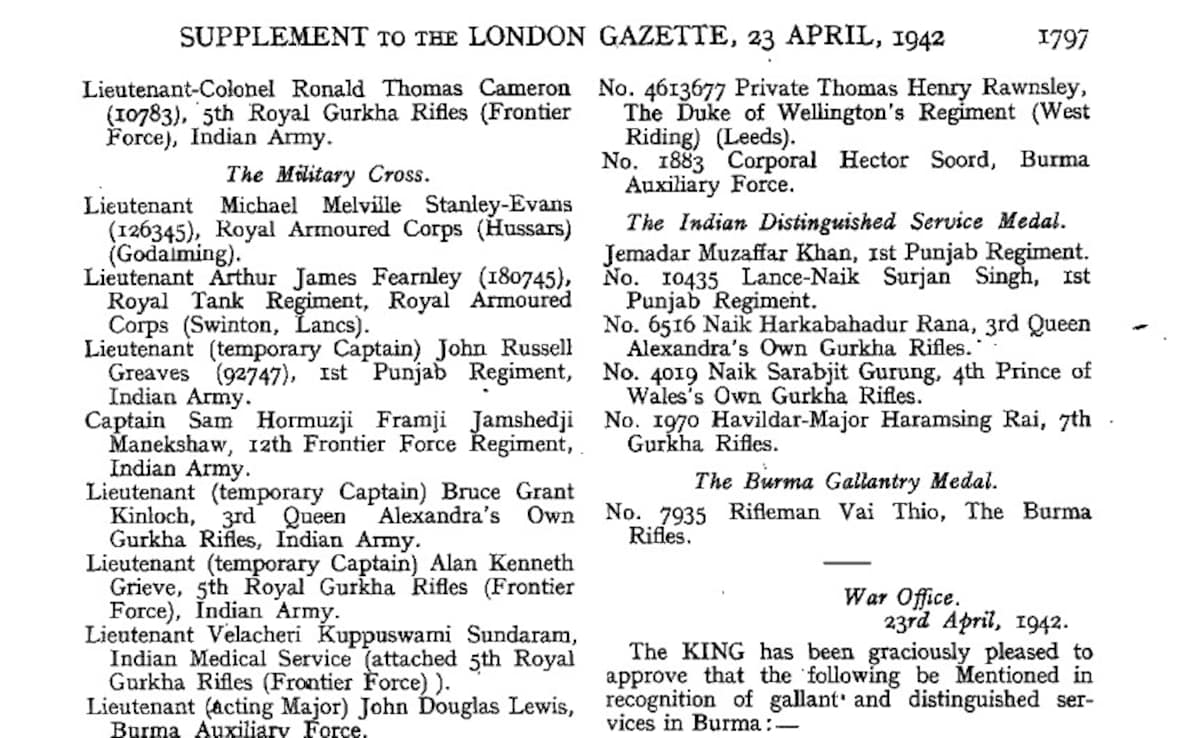
The life of Field Marshal Sam Hormuzji Framji Jamshedji Manekshaw has been turned into a motion picture, 'Sam Bahadur,' which was released today.
People remember him as the man who played a crucial role in bringing the Pakistan Army to its knees in 1971, a war that catapulted him as one of the greatest commanders in modern India, but almost 30 years ago in 1942 in Burma (now Myanmar), Sam Manekshaw defeated death to become a war hero.
Action In Burma, 1942
S.H.F.J Manekshaw was posted in the 4th Battalion of the 12th Frontier Force as a Captain in Burma and witnessed action during World War II when the Japanese were at the eastern doorstep of India.
The Americans wanted to keep the Japanese busy in China, while the Japanese Imperial Army, apart from Burma's resources, wanted to use it to cut off American military supply lines to already isolated China and use Burma as a launching pad for operations in British India.
Sam Manekshaw's 4/12 FF under the 17th Indian Infantry Division was deployed in the defense of Burma in 1942. The stretched British forces retreated to the Sittang railway bridge after the Japanese entered Burma and reached the Bilin River almost 48 km south of Sittang.
The plan was to cross the Sittang River, which runs north to south, and a small bridgehead was defended by undermanned 3 Burma Rifles. Sam Manekshaw's 4/12 FF was sent to reinforce the troops on the east of the bridgehead. The troops had to cross the river east to west on February 22 and then demolish the bridge with explosives.
Attack and Counter Attack
Sam Manekshaw was commanding the 'A' company of 4/12 FF. The soldiers from the Japanese 1/215 Regiment emerged from the jungles and attacked the Sittang village to take over the bridge.

An illustration of Battle of Sittang Bridge
Photo Credit: Image posted on Facebook by Gurkha Museum
The Japanese had taken control of the Buddha and Pagoda hill to dominate the approach. Captain Sam Maneskshaw's 'A' company along with Duke Of Wellington's 2nd Company counterattacked.
Captain Manekshaw was tasked to defend the approach from the left of the Sittang bridge. The counterattack was successful, but he suffered nine bullet injuries in his abdomen.
In an interview, Sam Manekshaw recalls, "The chap (Japanese soldier) emerged from the bushes and opened a burst of fire with his Tommy gun. I received nine bullets in my abdomen, and no one thought I would ever live."
Major General David Cowan, the GOC-in-C of the 17th Infantry Indian Division, saw Captain Manekhsaw and pinned his Military Cross on the injured Manekshaw's uniform to honour him as the gallantry medal was not awarded posthumously.

Sam Manekshaw was awarded the Military Cross. Clipping of London Gazette, 1942
Humor In The Face Of Death
Captain Sam's batman (a soldier assisting an officer), Sher Singh, carried him on his shoulder to the surgeon. The Australian doctor refused to treat him due to his serious abdomen injuries and his grim chances of survival and said, "Can't waste my time over him."
When Sam Manekshaw regained consciousness, the surgeon asked, "What happened to you, young chap," and injured Manekshaw responded, "A bloody mule kicked me." The surgeon laughed and said, "Oh! You have a sense of humour. You're worth saving."
Sam Bahadur
There were 10 Gorkha Regiments in the British Indian Army, and only British officers were allowed to command the battalions. When the British left in 1947, Sam Manekshaw became the first Indian to command a Gorkha Battalion.
Sam Manekshaw commanded the 8th Gorkha Rifles. He met a Gorkha sentry and asked him, "What's your name?" and he said, Harka Bahadur Gurung. Sam Manekshaw asked him, "Do you know my name?", the sentry paused for a second and replied, "Sam Bahadur".
Track Latest News Live on NDTV.com and get news updates from India and around the world

